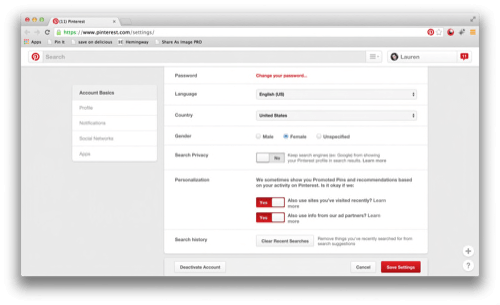Pinterest is unveiling some changes that will make it behave a lot more like Facebook, that is, if users choose to opt in.
Beginning on October 19, Pinterest will use information gleaned from your browsing history and from its advertising partners to recommend products to Pinterest users.
Pinterest will now be using Facebook’s tactics for collecting data, but not its methods. If you don’t want to be part of the new program, you’ve got a month to let Pinterest know. On your Settings page, simply toggle all the relevant permissions to “no.”

With the new changes to the privacy policy, Pinterest will have the ability to show you Promoted Pins based on your gender, your recent Internet history, and anything Pinterest’s ad partners happen to already know about you. It will collect log data, cookies from recent sites, and the devices you visited them on.
Previously, Pinterest prided itself on predominantly using your interests to advertise to you in the form of Promoted Pins: ostensibly relevant images that brands pay to put in your dashboard. Pinterest wants to show you products and experiences you’ve already indicated you’re interested in by pinning similar things in the past.
See also: Behind Pinterest’s Crackdown On Paid Pins: Stopping Visual Pollution
Earlier this year, Pinterest made a major effort to crack down on “paid to pin” programs, in which users are incentivized through cash, contest entries, or any other reason to pin a photo to their boards that otherwise doesn’t mesh with their interests. That’s because the primary information Pinterest has about users is what they’re pinning.
Apu Gupta, CEO of Pinterest analytical service Curalate, told ReadWrite how Pinterest’s audience targeting can differentiate from traditional advertising:
“In a traditional demographic based ad, I might give you an ad for camping equipment because you’re 25 to 35 and male. But on Pinterest, I’d advertise it because you’re pinning a lot of camping equipment. I don’t care that you’re actually 55. I know you’ll be a buyer.”
See also: How Pinterest Is Slowly Learning How To Make Money
It doesn’t seem like outside data logs and cookies could be more accurate than what you’re pinning. Some people use shared computers; others may access sites for business as well as pleasure, sites that don’t 100% reflect their favorite things.
However, this change isn’t for Pinterest’s benefit. It’s for Pinterest’s advertisers:
“We want to help advertisers better understand how their Promoted Pins are doing,” wrote Julie Park, head of partnerships. “For example, an advertiser may want to know how often their ads are showing on Pinterest or how many people bought a product after clicking on a Promoted Pin. In the future, we’ll report that info to them.”
If you don’t care about making it easier for advertisers to sell you stuff, Pinterest has been remarkably transparent, offering a full month for users to leave the program.
Photo via Pinterest blog
















